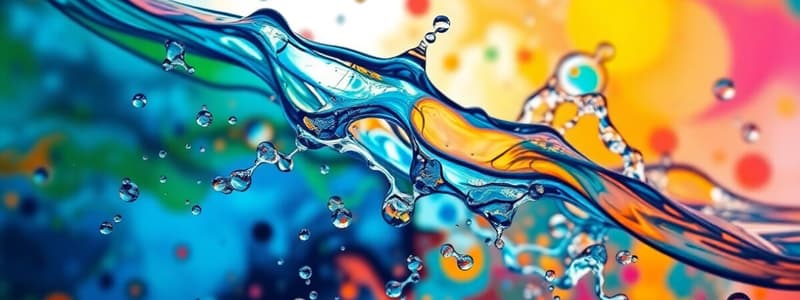Podcast
Questions and Answers
What is the specific heat capacity of water primarily responsible for?
What is the specific heat capacity of water primarily responsible for?
- Allowing sand to retain heat longer than water
- Increasing the rate of evaporation in hot weather
- Making water a poor conductor of heat
- Minimizing temperature changes in the environment (correct)
How much heat is required to vaporize one gram of water at its boiling point?
How much heat is required to vaporize one gram of water at its boiling point?
- 100 cal/g
- 540 cal/g (correct)
- 212 cal/g
- 300 cal/g
What phenomenon occurs as water evaporates from a surface?
What phenomenon occurs as water evaporates from a surface?
- The surface temperature increases significantly
- The surface remains unchanged in temperature
- The surface cools down (correct)
- The surface absorbs energy from the air
Which of the following statements about water's specific heat capacity is true?
Which of the following statements about water's specific heat capacity is true?
Why do land areas cool faster than bodies of water at night?
Why do land areas cool faster than bodies of water at night?
What primarily causes water molecules to form hydration shells around solute molecules?
What primarily causes water molecules to form hydration shells around solute molecules?
Why do nonpolar substances such as oils not dissolve in water?
Why do nonpolar substances such as oils not dissolve in water?
What effect does freezing have on the density of water?
What effect does freezing have on the density of water?
What property of water requires significant heat input to raise its temperature?
What property of water requires significant heat input to raise its temperature?
How does the presence of ice on bodies of water affect the organisms below?
How does the presence of ice on bodies of water affect the organisms below?
What feature of water molecules is primarily responsible for their ability to form hydrogen bonds?
What feature of water molecules is primarily responsible for their ability to form hydrogen bonds?
Which of the following statements about hydration shells is true?
Which of the following statements about hydration shells is true?
What happens to the density of water as it cools and approaches its freezing point?
What happens to the density of water as it cools and approaches its freezing point?
What is cohesion in the context of water molecules?
What is cohesion in the context of water molecules?
What phenomenon is primarily responsible for the high surface tension of water?
What phenomenon is primarily responsible for the high surface tension of water?
What is capillary action?
What is capillary action?
Why is water considered the 'universal solvent'?
Why is water considered the 'universal solvent'?
What accounts for the polar nature of a water molecule?
What accounts for the polar nature of a water molecule?
Which of the following statements about adhesion is true?
Which of the following statements about adhesion is true?
What role do cohesive and adhesive forces play in the biology of water transport?
What role do cohesive and adhesive forces play in the biology of water transport?
What occurs when water molecules are exposed to nonpolar substances?
What occurs when water molecules are exposed to nonpolar substances?
What is the reason for the bent shape of a water molecule?
What is the reason for the bent shape of a water molecule?
Why is water classified as a polar molecule?
Why is water classified as a polar molecule?
What type of bonding occurs between water molecules?
What type of bonding occurs between water molecules?
What term describes substances that dissolve well in water?
What term describes substances that dissolve well in water?
What best characterizes the cohesion of water molecules?
What best characterizes the cohesion of water molecules?
What is the charge distribution within a water molecule?
What is the charge distribution within a water molecule?
What type of molecules do not interact well with water?
What type of molecules do not interact well with water?
Which of the following statements about water's properties is true?
Which of the following statements about water's properties is true?
Flashcards are hidden until you start studying
Study Notes
Properties of Water
- Water constitutes 60-70% of organisms, supporting life through unique chemical properties crucial to biology.
Polarity of Water Molecules
- A water molecule comprises two hydrogen atoms bonded to one oxygen atom, creating a bent structure.
- Oxygen's higher electronegativity attracts electrons closer to itself, resulting in a partial negative charge for oxygen and partial positive charges for hydrogen.
- Water is a polar molecule due to its polar covalent bonds and bent shape.
Hydrogen Bonding
- Polarity allows water molecules to attract each other, forming hydrogen bonds between the partial positive hydrogen atoms and the partial negative oxygen atoms.
- Hydrogen bonds are weak and require the hydrogen atom to be attached to electronegative atoms like oxygen, nitrogen, or fluorine.
- Water forms hydrogen bonds with other polar molecules and ions, exhibiting hydrophilic interactions.
Cohesion of Water
- Water molecules exhibit strong cohesion due to hydrogen bonding, leading to surface tension, which allows water to form a dome shape on surfaces, such as a coin.
- Cohesion is critical for phenomena like the ability of water striders to walk on water due to surface tension.
Adhesion of Water
- Adhesion occurs when water molecules stick to different types of molecules, particularly polar ones, enabling capillary action.
- Capillary action allows water to travel upward in capillary tubes, essential for nutrient transport in plants.
Solvent Properties of Water
- Water is termed the "universal solvent" because of its ability to dissolve diverse solutes, particularly ions and polar molecules.
- Polar water molecules form hydration shells around solutes, allowing for even dispersion in aqueous solutions.
- Nonpolar substances, like oils, do not dissolve in water and instead remain separate, termed hydrophobic.
Density of Ice and Water
- Ice has a lower density than liquid water due to the arrangement of hydrogen bonds, causing water to expand upon freezing.
- Ice floats on liquid water, providing insulation for aquatic life during winter, as it forms a protective layer over bodies of water.
Heat Capacity of Water
- Water exhibits a high specific heat capacity, requiring considerable energy to increase temperature due to hydrogen bond disruption.
- It minimizes temperature changes in the environment, contributing to climate moderation and stable living conditions.
Heat of Vaporization of Water
- Water's high heat of vaporization requires significant energy to transform liquid water into gas, around 540 cal/g at 100 °C.
- As water evaporates, it cools the surrounding surface, exemplified by the cooling effect of sweat evaporation on the human body.
Studying That Suits You
Use AI to generate personalized quizzes and flashcards to suit your learning preferences.




